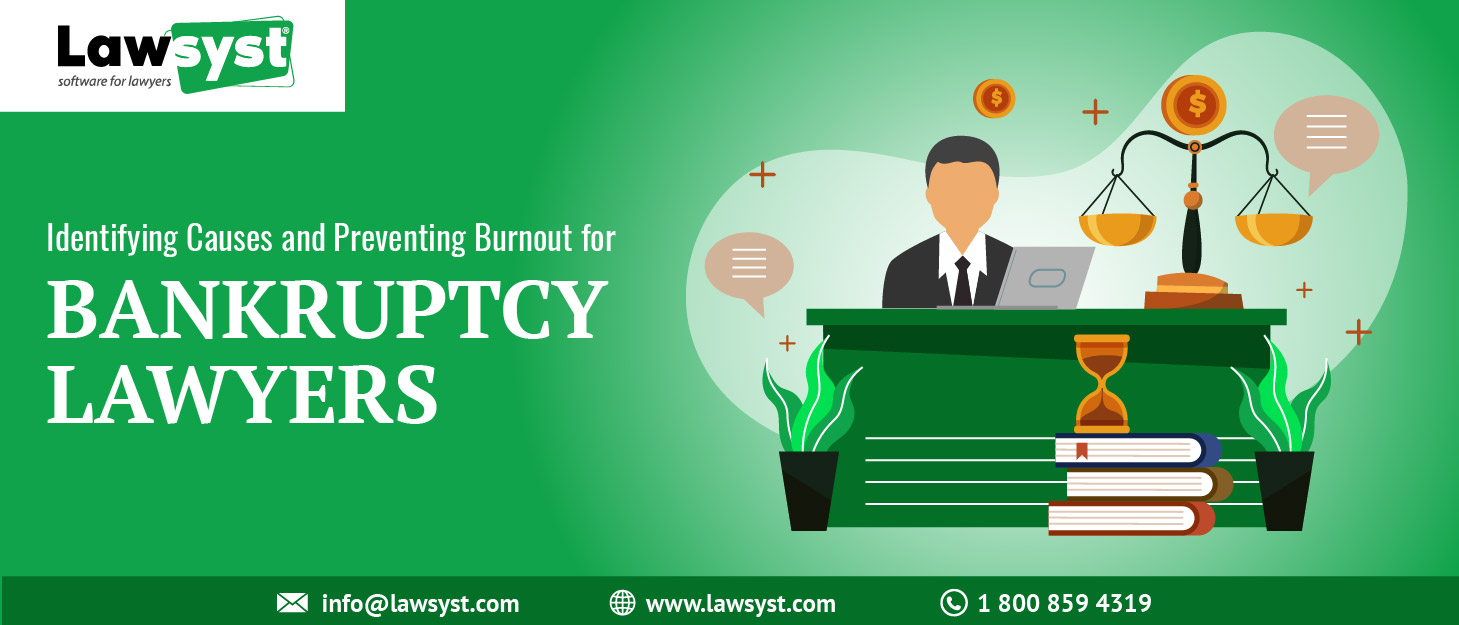Burnout is a significant issue among professionals in high-stress fields, and bankruptcy lawyers are no exception. In the demanding world of bankruptcy law, lawyers face a unique set of challenges that can contribute to this pervasive problem. The combination of heavy caseloads, where lawyers must juggle numerous clients and court dates, emotionally charged cases involving clients in dire financial straits, and the intricate complexities of bankruptcy law, which require meticulous attention to detail and constant updates on legal changes, all create a perfect storm for burnout. The relentless pressure and the emotional weight of these responsibilities can lead to physical and mental exhaustion, detachment, and a sense of ineffectiveness.
This article explores the multifaceted causes of burnout among bankruptcy lawyers and offers practical strategies to prevent and manage this condition, ensuring better mental health and professional longevity for those in the field.
Understanding Employee Burnout in Bankruptcy Law Firms
Burnout is a state of chronic physical and emotional exhaustion, often accompanied by feelings of cynicism, detachment, and a sense of ineffectiveness. For bankruptcy lawyers, the unique stressors of their profession can contribute to this condition. Understanding these stressors is the first step toward addressing the problem.
Causes of Burnout
Understanding the root causes of burnout is essential for addressing this pervasive issue among bankruptcy lawyers. The pressures of the legal profession are multifaceted, and for those specializing in bankruptcy, the challenges are particularly pronounced. This section delves into the primary causes of burnout among bankruptcy lawyers, providing a comprehensive overview of the various stressors that can lead to this debilitating condition.
High Workload and Long Hours
Bankruptcy lawyers often face demanding workloads. The volume of cases, combined with tight deadlines and extensive paperwork, can lead to long hours and insufficient rest. The constant pressure to meet client needs and court deadlines can be overwhelming.
Emotional Toll
Bankruptcy cases are inherently stressful, involving clients who are often in desperate financial situations. Lawyers may absorb their clients' stress and anxiety, leading to emotional fatigue. The emotional toll of dealing with distressed clients regularly can be significant.
Complex Legal Environment
The intricacies of bankruptcy law require a high level of expertise and attention to detail. Keeping up with changing laws and regulations adds to the complexity and stress. This can contribute to mental fatigue and a feeling of being overwhelmed.
Professional Isolation
The demanding nature of the job can lead to professional isolation. Lawyers may find themselves working long hours with little time for social interaction or networking. This isolation can exacerbate feelings of stress and burnout.
Lack of Control
Bankruptcy lawyers often have limited control over their schedules and workloads. Unpredictable case developments and client emergencies can disrupt plans, leading to a sense of helplessness and lack of control over one’s work-life balance.
Prevention Strategies
Preventing burnout requires a multifaceted approach that addresses both individual and organizational factors. Here are some strategies to help bankruptcy lawyers manage stress and maintain their well-being.
Workload Management
Effective workload management is crucial for preventing burnout among bankruptcy lawyers. Key strategies include delegating tasks, setting realistic deadlines, and prioritizing work to ensure a manageable and efficient workflow. Delegating tasks can involve assigning routine or administrative duties to paralegals or junior staff, allowing lawyers to focus on complex legal issues. Setting realistic deadlines can help prevent the buildup of last-minute pressure while prioritizing work ensures that the most critical tasks are addressed promptly.
In addition to these strategies, utilizing technology, particularly bankruptcy law practice management software like Lawsyst, can significantly enhance workload management. These software solutions offer a range of tools designed to streamline legal processes and reduce administrative burdens. For instance, they often include features such as automated document generation, case tracking, deadline reminders, and client communication portals. By automating routine tasks, lawyers can save time and reduce the risk of human error.
Practice management software can also facilitate better organization of case files and documents, making it easier to retrieve information and manage multiple cases simultaneously. It provides a centralized platform where all case-related information is stored, ensuring that lawyers have quick and easy access to necessary documents and data. Furthermore, these systems often include time-tracking and accounting software for lawyers, which help them monitor time allocation across various tasks and track billable hours, enabling more efficient time management and billing practices.
Emotional Support and Self-Care
Lawyers should prioritize self-care to manage the emotional toll of their work. This encompasses a range of activities and practices designed to maintain physical and mental well-being.
Regular Exercise: Engaging in regular physical activity is a powerful way to combat stress and improve overall health. Exercise releases endorphins, which are natural mood lifters. It also helps in reducing the symptoms of anxiety and depression, which can be prevalent in high-stress professions. Whether it is a daily run, yoga session, or a visit to the gym, incorporating physical exercise into a routine can significantly mitigate the effects of burnout.
Mindfulness Practices: Mindfulness and meditation are effective techniques for managing stress and improving mental clarity. Practices such as deep breathing, meditation, and yoga can help lawyers stay grounded and focused, reducing feelings of overwhelm. Mindfulness encourages being present in the moment, which can help in managing the constant mental chatter and stress associated with demanding work environments.
Seeking Support: Social support is crucial for mental health. Lawyers should not hesitate to seek emotional support from friends and family. Talking about challenges and experiences with trusted individuals can provide a sense of relief and perspective. Additionally, professional counseling can offer tailored strategies to cope with stress. Therapists or counselors who specialize in high-stress professions can provide valuable tools and techniques for managing burnout.
Establishing Boundaries: Self-care involves setting clear boundaries between work and personal life, such as specific work hours, communicating boundaries to colleagues and clients, and taking meaningful vacations for mental rejuvenation.
By prioritizing these self-care strategies, bankruptcy lawyers can better manage the emotional toll of their work, reduce stress, and maintain a healthier, more balanced lifestyle.
Professional Development and Training
Ongoing professional development is crucial for lawyers to stay updated with the latest legal changes, reducing the stress associated with the complexity of bankruptcy law. Attending seminars, workshops, and networking events not only enhances legal knowledge but also combats professional isolation. These activities provide valuable networking opportunities, fostering a sense of community and support among peers.
Organizational Support
Organizational support plays a crucial role in mitigating burnout among bankruptcy lawyers. Law firms must cultivate a supportive work culture, offering resources for stress management, such as counseling services or wellness programs. Flexible work arrangements, including remote work options or adjusted schedules, can empower lawyers to maintain a healthier work-life balance. Regular check-ins and feedback mechanisms enable firms to proactively identify stressors and implement necessary interventions.
By prioritizing the well-being of their employees and fostering an environment that values work-life balance, organizations can significantly reduce the risk of burnout among bankruptcy lawyers.
Peer Support and Mentorship
Establishing a culture of peer support and mentorship within the legal community can markedly alleviate feelings of isolation. Seasoned attorneys can offer valuable mentorship to junior colleagues, offering guidance and support. Additionally, participation in peer support groups provides a vital outlet for sharing experiences and exchanging coping strategies, fostering a sense of camaraderie and solidarity among bankruptcy lawyers.
Time Management and Planning
Time Management and Planning are crucial components in the prevention of burnout. Bankruptcy lawyers must master the art of allocating their time wisely, ensuring that they incorporate breaks and downtime into their schedules. Utilizing tools and techniques like time blocking can be instrumental in this endeavor, allowing lawyers to allocate specific time slots for various tasks and prioritize their workload efficiently.
By implementing effective time management strategies, lawyers can safeguard against burnout, ensuring they have adequate time to recharge and maintain their well-being amidst the demanding nature of their profession.
Seeking Professional Help
Seeking professional help is paramount when burnout symptoms escalate. If feelings of exhaustion, detachment, and ineffectiveness persist, consulting mental health professionals becomes imperative. These experts offer tailored strategies to alleviate stress and enhance mental well-being, aiding in the prevention of burnout exacerbation.
Early intervention is key, as prompt assistance can curb the progression of burnout into a more severe and debilitating condition. By recognizing the signs and proactively seeking support, bankruptcy lawyers can safeguard their mental health and maintain their professional effectiveness.
Conclusion
Addressing burnout among bankruptcy lawyers requires a comprehensive understanding of its causes and proactive implementation of prevention strategies. The demanding nature of bankruptcy law creates fertile ground for burnout, but effective workload management, self-care, professional development, organizational support, peer mentorship, and tools like bankruptcy law software can help mitigate the risk.
Furthermore, organizational support, peer mentorship, and the use of bankruptcy law software like Lawsyst can significantly enhance efficiency and reduce stress levels. By adopting a proactive approach to addressing burnout, bankruptcy lawyers can ensure better mental health and professional longevity in their careers.






